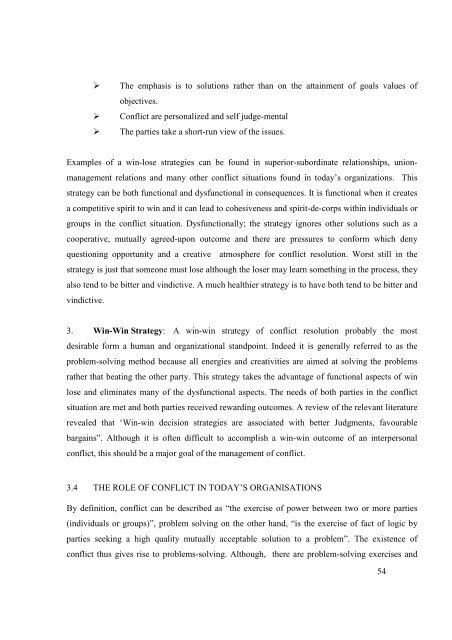HCM 433 MANGEMENT AND ORGANIZATIONAL BEHAVIOUR.pdf
HCM 433 MANGEMENT AND ORGANIZATIONAL BEHAVIOUR.pdf
HCM 433 MANGEMENT AND ORGANIZATIONAL BEHAVIOUR.pdf
You also want an ePaper? Increase the reach of your titles
YUMPU automatically turns print PDFs into web optimized ePapers that Google loves.
The emphasis is to solutions rather than on the attainment of goals values of<br />
objectives.<br />
Conflict are personalized and self judge-mental<br />
The parties take a short-run view of the issues.<br />
Examples of a win-lose strategies can be found in superior-subordinate relationships, unionmanagement<br />
relations and many other conflict situations found in today’s organizations. This<br />
strategy can be both functional and dysfunctional in consequences. It is functional when it creates<br />
a competitive spirit to win and it can lead to cohesiveness and spirit-de-corps within individuals or<br />
groups in the conflict situation. Dysfunctionally; the strategy ignores other solutions such as a<br />
cooperative, mutually agreed-upon outcome and there are pressures to conform which deny<br />
questioning opportunity and a creative atmosphere for conflict resolution. Worst still in the<br />
strategy is just that someone must lose although the loser may learn something in the process, they<br />
also tend to be bitter and vindictive. A much healthier strategy is to have both tend to be bitter and<br />
vindictive.<br />
3. Win-Win Strategy: A win-win strategy of conflict resolution probably the most<br />
desirable form a human and organizational standpoint. Indeed it is generally referred to as the<br />
problem-solving method because all energies and creativities are aimed at solving the problems<br />
rather that beating the other party. This strategy takes the advantage of functional aspects of win<br />
lose and eliminates many of the dysfunctional aspects. The needs of both parties in the conflict<br />
situation are met and both parties received rewarding outcomes. A review of the relevant literature<br />
revealed that ‘Win-win decision strategies are associated with better Judgments, favourable<br />
bargains”. Although it is often difficult to accomplish a win-win outcome of an interpersonal<br />
conflict, this should be a major goal of the management of conflict.<br />
3.4 THE ROLE OF CONFLICT IN TODAY’S ORGANISATIONS<br />
By definition, conflict can be described as “the exercise of power between two or more parties<br />
(individuals or groups)”, problem solving on the other hand, “is the exercise of fact of logic by<br />
parties seeking a high quality mutually acceptable solution to a problem”. The existence of<br />
conflict thus gives rise to problems-solving. Although, there are problem-solving exercises and<br />
54
















